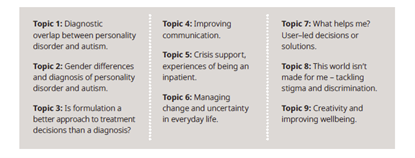How should we use the WTCO fund to make the biggest positive impact possible for people who meet the criteria for a diagnosis of personality disorder, asks founder Fiona Riddoch?
Fiona Riddoch
It was really exciting for us at Words That Carry On (WTCO) to give out our first research grant in October 2020. The funding went to a team led by City University to analyse diagnosis and its implications: particularly the diagnostic processes for autism and personality disorder. A huge thanks goes to all those who donate and continue to support us.
With mental health issues accounting for a quarter of all illnesses but receiving only 6% of UK research funding, there is still plenty to do. So what next? How should we use the WTCO fund to make the biggest positive impact possible for people who meet the criteria for a diagnosis of personality disorder?
We plan to be guided by the findings of the In Your Words survey, carried out by the McPin Foundation in 2019. This saw 358 individuals, relatives, clinicians and mental health professionals give their time and expertise to identify and prioritise the most important unanswered research topics.

The most important topic – diagnosis and the overlap with autism – is the research we funded in October. But we also plan to address the other topics.
Survey participants graded the nine topics above from ‘very important’ to ‘not important at all’. All topics scored highly for importance with some variations among the different participant groups.
Unsurprisingly, it was the topics concerning the operation and processes around day-to-day support that drew the highest scores:
4) Improving Communication
5) Crisis support and the experience of being an inpatient
8) Tackling stigma and discrimination.
Are there different, more credible approaches? Alternative service provision? And how do we improve access to the right support? Is a radical rethink needed?
These topics reflect experiences that occur repeatedly in the lives of those who experience mental health difficulties, and particularly those with a personality disorder diagnosis (see the expanded topic descriptions below).
There was a feeling among survey participants that great changes are needed within the NHS to achieve meaningful communication between all involved – the individual, their friends and family, clinicians, social workers, and other professionals. The wish to see change in crisis support and inpatient care suggests that the existing model is not working.
Are there different, more credible approaches? Alternative service provision? And how do we improve access to the right support? Is a radical rethink needed?
Entrenched stigma adds to the support challenges. Even among clinicians and mental health professionals, the phrase “difficult patient” often gets attached to the label of personality disorder. This exacerbates the stigma and leads to individuals being seen as a problem from the outset rather than a person with unmet needs.
Hope for better
There is an urgent requirement for innovative, fundamental research to get at a far better understanding of this diagnosis. Research which focuses on the person not the label, and removes “difficult” from “patient”.
All the challenges identified in the 2019 survey are un-addressed and are robbing people of much needed resources to lead more fulfilling lives. Working with likeminded groups, Words that Carry On will fund original co-produced research with people with relevant lived experience to improve understanding of the topics. We shall work with other organisations to promote positive policy and encourage positive change.
We aim to create hope and a confidence in a better future for people living with mental health difficulties and particularly those with a diagnosis of personality disorder.
Fiona Riddoch is the founder of Words That Carry On. You can read more about the topics in the appendix of the scoping survey report.
